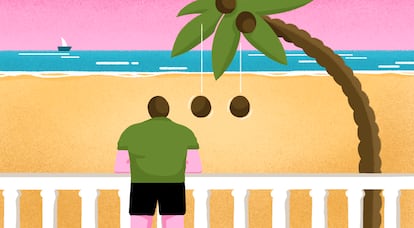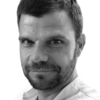I think, therefore I (dis)connect: The existentialism of vacations
While on vacation your initial goal may be ‘to do absolutely nothing,’ but the questioning of life and its meaning is inherent to the human condition

Going on vacation is something that sounds good right off the bat. Whether it’s to do many things or to do nothing at all, vacations give us a horizon to look towards. And as this horizon nears, different visions appear, each one with its own idiosyncrasies. For those of us who like to settle somewhere and seek out a different routine — but a routine nonetheless — the idea of a vacation is mainly seen as the period in which time becomes more flexible, the contours of schedules blur and rhythms are confused. The toils of the world of work are placed in parentheses, following the phenomenological praxis of Edmund Husserl, and with this, the steps of day-to-day life are gradually softened and spaced out. The daily agenda is pulled apart, and bit by bit the increasingly slow cadence of the vacation routine takes center stage. It’s a routine that finds its natural habitat in simplicity. In the first two or three days, we can still hear the echo of that voice that orders our day: now this, then that, and that other at night. But from there, the sequence of time become more disperse. Like the waves of the sea, where it’s difficult to follow the current, the days, with their respective dates, begin to overlap and merge into a kind of totality of foamy contours.
It is possible that those of us who like this type of low-hustle vacation have said sometime a few weeks before: “When I’m on vacation, I won’t do anything.” A declaration of intent that just by being announced already commits us in some way. So much so that when the holidays do arrive, in its first days, we try not to do anything, and what’s more, try to be fully away that we are not doing anything. It’s an obvious oxymoron, of course, because we are always thinking and doing something. Our hearts are restless, as philosophy often reminds us. But the longing for dolce far niente only highlights our will to concentrate our efforts to feel that there are no demands of us and to counter-program the acceleration and tension.
One of the ways to try to change the pace is usually to indulge in long hours of reading, which, by the way, sometimes ends up delivering us into the arms of Morpheus. Drifting off while reading happens spontaneously and is no reflection of the book itself. Indeed, one of the many pleasures of summer reading (and reading throughout the year) is when the book finally falls from your hand, while the eyelids also give in little by little to the light sleep that has been courting them.
Some of us try to read on vacation the books that we have had to put off throughout the year. For whatever reason, the bookshelf reserved for holiday books is always full, which is why easing some of its load is one of the most common goals for August. In my case, I have been rereading, in a disorderly fashion, fragments written by Søren Kierkegaard, the 19th century Danish thinker who can be considered the first existentialist. So for these holidays I have set myself the goal, among other objectives, of finishing Clare Carlisle’s biography of this philosopher, which is subtitled: “The restless life of Søren Kierkegaard.”
You may ask: But why? How can you read Kierkegaard when it’s 30ºC in the shade? Aside from sounding pretentious, isn’t that just the opposite of the idea of slowing down the rhythms of the inner world?
I have also asked myself that. Kierkegaard’s work always has an impact on the psychic, and if he transmits anything, it is that freedom means making a decision, and deciding always means giving up. Knowing what to renounce, what one does not want to do and, above all and most difficult of all, what one wants, is the ongoing personal and non-transferable dialectic to which we are time and again forced to confront. And on vacation, you feel like anything but being overwhelmed.
But the thing is, life doesn’t take vacations. Just as you get used to the new rhythm, a breeze of self-awareness may break through. For no apparent reason or cause. Something happens to remind us that living also means wondering about life and how it is being lived. Regardless of the date on the calendar. It is usually another characteristic of the holidays that after the dolce far niente at some point, we start to want to return to the usual routine, as if having time off was fine, but only for a few days. As if what mattered was changing routines, or rather running away from them when they become too established, and we are no longer enthralled by their novelty.
Maybe learning to live happens by knowing how to enter into a dialogue with that flow of vital questioning. Above all, since an answer is followed by another question, which is deeper and more magmatic. Who knows. In any case, the radical nature of this opening manifests itself more intensely the fewer things are thrown at it, the more the environment quietens down and the more the inner self takes center stage. It’s not in vain that vacation — both its sense and the word itself — brings to mind the idea of vacancy, of emptiness. And we already know that in our cultural context everything that has to do with emptiness instills, right off the bat, respect.
Yes, it's true, all of this may sound quite existential, especially for these holidays. But it is no less true that in one way or another we are always locating ourselves in the world and wondering about those paths that can add meaning and fullness to the life project that we have in hand. This is also part of everyday life, both on weekdays and on holidays.
It may sound very existential, certainly, but I sense that there is nothing better than taking a vacation to confirm it.
Sign up for our weekly newsletter to get more English-language news coverage from EL PAÍS USA Edition
Tu suscripción se está usando en otro dispositivo
¿Quieres añadir otro usuario a tu suscripción?
Si continúas leyendo en este dispositivo, no se podrá leer en el otro.
FlechaTu suscripción se está usando en otro dispositivo y solo puedes acceder a EL PAÍS desde un dispositivo a la vez.
Si quieres compartir tu cuenta, cambia tu suscripción a la modalidad Premium, así podrás añadir otro usuario. Cada uno accederá con su propia cuenta de email, lo que os permitirá personalizar vuestra experiencia en EL PAÍS.
¿Tienes una suscripción de empresa? Accede aquí para contratar más cuentas.
En el caso de no saber quién está usando tu cuenta, te recomendamos cambiar tu contraseña aquí.
Si decides continuar compartiendo tu cuenta, este mensaje se mostrará en tu dispositivo y en el de la otra persona que está usando tu cuenta de forma indefinida, afectando a tu experiencia de lectura. Puedes consultar aquí los términos y condiciones de la suscripción digital.









































